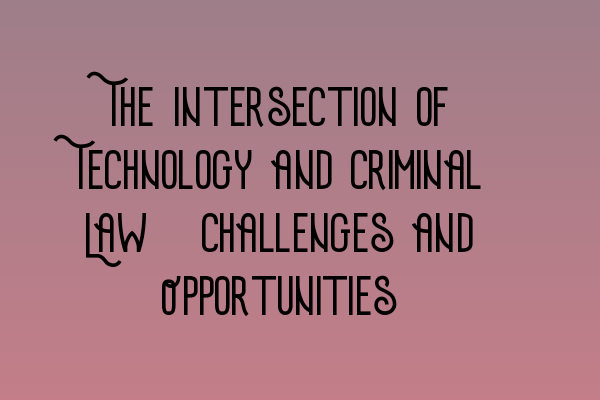The Intersection of Technology and Criminal Law: Challenges and Opportunities
In today’s digital age, technology is rapidly advancing and reshaping various aspects of society, including the field of criminal law. From cybercrimes to digital evidence, the intersection of technology and criminal law presents both challenges and opportunities for legal professionals.
Challenges in the Digital Frontier
With the rise of technology, criminals have found new ways to exploit its capabilities for nefarious purposes. Cybercrimes, such as hacking and identity theft, have become more prevalent, posing significant challenges for law enforcement and legal practitioners.
One of the main challenges is the ever-evolving nature of technology. Criminals are constantly finding new methods to commit crimes, making it difficult for laws and regulations to keep up. This requires criminal law professionals to stay abreast of the latest technological advancements and continuously update their knowledge and skills.
Another challenge is the anonymity offered by the internet. Criminals can hide behind fake identities and IP addresses, making it hard to track them down. Investigating cybercrimes often involves complex digital forensic techniques, requiring specialized knowledge and resources. As a result, collaboration between law enforcement agencies, technology experts, and legal professionals is essential to effectively tackle cybercrimes.
The Role of Digital Evidence
In the digital age, evidence has evolved beyond physical documents and witness testimonies. Digital evidence, such as emails, text messages, social media posts, and CCTV footage, plays a crucial role in criminal investigations and courtroom proceedings. It provides valuable insights into a suspect’s activities, intentions, and connections.
However, the increasing reliance on digital evidence brings its own set of challenges. Ensuring the authenticity and integrity of digital evidence is crucial to its admissibility in court. Legal professionals must be familiar with the rules and procedures for handling, preserving, and presenting digital evidence to ensure its reliability.
Moreover, the sheer volume of digital evidence in modern criminal cases can be overwhelming. Reviewing mountains of data requires efficient technology tools and skilled personnel to extract relevant information efficiently. The ability to navigate through complex digital records and present the most compelling evidence is crucial for a successful prosecution or defense.
Opportunities for Legal Professionals
While technology presents challenges, it also provides opportunities for legal professionals working in criminal law. The advancements in technology have paved the way for innovative solutions that can enhance the efficiency and effectiveness of legal processes.
One such opportunity is the use of artificial intelligence (AI) in legal research and case management. AI-powered tools can analyze vast amounts of legal documents, precedents, and rulings to provide valuable insights and support legal arguments. These tools can save time and improve the accuracy of legal research, allowing legal professionals to focus on other critical aspects of their cases.
Additionally, technology has facilitated collaboration and communication within the legal community. Online platforms, webinars, and workshops allow legal professionals to share knowledge, stay updated on the latest developments, and connect with experts in the field. The ability to network and learn from peers and industry leaders can significantly enhance a legal professional’s skills and career prospects.
The Way Forward
As technology continues to advance, the challenges and opportunities at the intersection of technology and criminal law will persist. Legal professionals must embrace technology and develop the necessary skills to navigate the digital frontier effectively.
Continued education, such as SQE workshops and webinars, can provide legal professionals with the knowledge and tools to excel in the ever-changing landscape of criminal law. Additionally, staying informed about business regulations, LLC formation, and Delaware corporate law can equip legal professionals with a comprehensive understanding of the legal framework surrounding technology-related criminal offenses.
By staying proactive, collaborating across disciplines, and leveraging technology, legal professionals can effectively address the challenges and leverage the opportunities presented by the intersection of technology and criminal law.
Sources:
– LLC Formation Made Simple: Step-by-Step Guide for UK Entrepreneurs
– Business Regulations in the UK: A Comprehensive Overview
– SQE Workshops and Webinars: Accelerate Your Exam Preparation
– Delaware Corporate Law for UK Solicitors: Key Insights and Practices
– Demystifying the Solicitors Qualifying Examination Format
